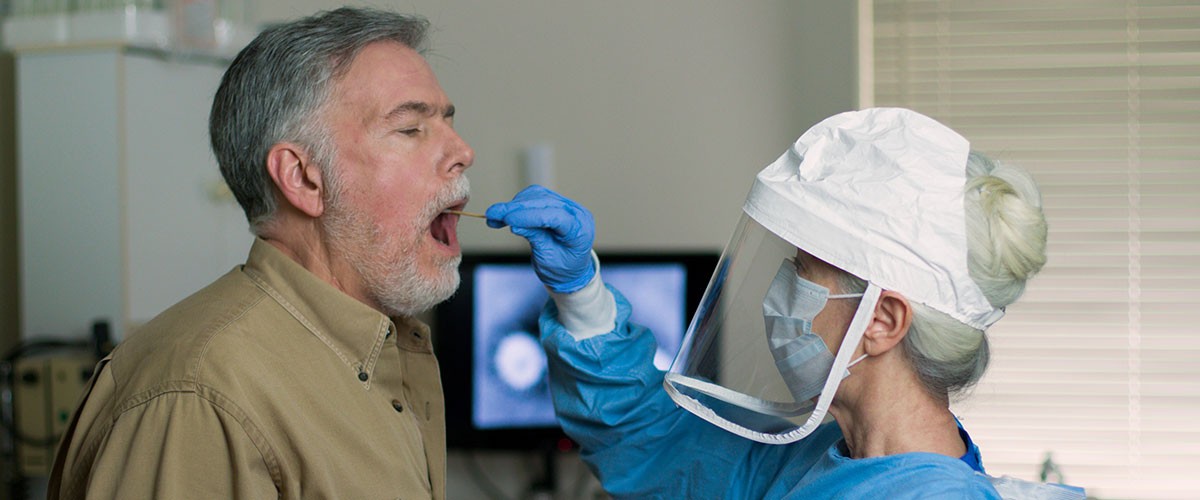Tech Journal Amid the Pandemic, Providence Embraces the Journey to Modern Healthcare
By Mike Gaumond / 16 Mar 2021 / Topics: DevOps Microsoft 365 Deployment Agile

With the speed to deliver quality care never more vital than during the COVID-19 crisis, Providence found new ways to modernize how it delivers the right technology to its team of 120,000 caregivers, particularly as tens of thousands of them transitioned to remote work.
In January 2020, Providence became the first health system in the United States to treat a patient who tested positive for COVID-19. The occasion not only marked the change of life as we once knew it, but it also sent the healthcare organization on a journey to completely modernize how its clinical staff, knowledge workers and even patients use technology.
Providence, a healthcare system with 120,000 caregivers working at 51 hospitals and nearly 1,100 clinics across the West Coast and into Texas, was already undergoing a digital transformation before the pandemic arrived. With the healthcare industry’s conservative approach to technology — often lagging years, if not decades, behind leading industries as it traditionally favors stability over innovation — Providence began working with Microsoft on a multiyear IT facelift in 2019 that called for migrating from on-premises data centers and workstreams to an Azure environment.
The digital transformation meant consolidating thousands of applications spread across many regional data centers to a cloud network driven by Office 365.
In these early stages, Insight stepped in to help Providence navigate the dynamics of cloud-based subscription licensing, helping the IT department evolve from perpetual-based, on-premises enterprise licensing agreements. At the time, the organization was migrating into Microsoft 365 while decommissioning redundant applications and driving adoption and training for the new collaboration environment. Providence also started moving to more modern Agile and DevOps processes.
COVID-19 introduced an entirely new set of challenges that extended well beyond the growing number of novel coronavirus cases walking through the health system’s doors. The pandemic also punctuated the need to accelerate improvements to Providence’s caregiver experience.
The remote transition
For Providence, the need to work remotely was fairly foreign since most of the organization’s workers traditionally worked in an office or clinical setting and didn’t travel. Yet the pandemic necessitated a sudden mobilization of the health system’s workforce, as tens of thousands of knowledge workers were sent to work from home literally overnight.
“From an IS standpoint, we had to assess who was at home and what they needed, with the idea of being able to give them the right technologies based on the jobs they had to do,” said Ryan Klein, Providence’s vice president of enterprise information systems. “We needed to establish caregiver personas enabling us to enable secure access to our networks and ensure that we could deliver them the correct hardware with the correct software in a timely way in a completely new deployment model.”
Customary office desktop workstations needed to be swapped for laptops, yet it normally took several weeks to provision and configure a new device based on an employee’s role and the level of access needed. With patient care top of mind at a critical time, Providence understood that traditional provisioning wouldn’t suffice when thousands of devices needed to be put into caregivers’ hands immediately.
Klein sought to create a procurement experience akin to personal online shopping, allowing an employee to select the device of their choice, have it delivered directly to their home, ready to go out of the box, with all the needed applications — and without the complication of additional IT support to set it up.
Provisioning as a consumer-like experience
“This is where our relationship with Insight started to really shine because we needed everything to happen very quickly. Insight could pull an order, configure a device and ship within 24 hours, allowing me to drop a new laptop onto a caregiver’s desk at home within a couple of days,” said Klein.
Providence’s modernized provisioning process rapidly evolved into ReadyTECH, a consumer-like self-service portal run in partnership with Insight that gives staff the ability to order new devices, with pre-loaded applications based on user personas and zero-touch deployment. Providence’s ServiceNow instance is integrated with Insight’s SAP-based ordering system, establishing a direct conduit for the health system to access a repository of mobile devices, webcams and other essential hardware from Insight’s deep partner network.
The new system reduces Providence’s provisioning steps from nine to three, according to Klein. But besides a better user experience, the streamlined ReadyTECH process has also optimized supply costs for Providence.
Now, Insight and Providence are exploring partnership opportunities in other areas, including the health system’s management of mobile devices.
“It’s completely revolutionizing the way that we build and deliver technology to our caregivers at a pace that was just unheard of for us prior to the pandemic. The biggest compliment we can get from our staff is that we’ve met the same expectations they have in their personal lives when ordering something. To be able to deliver a work device with those same expectations is pretty astounding,” expressed Klein.
Care delivered through meaningful connections
While ReadyTECH initially met the needs of Providence’s now home-based knowledge workers, the benefits are also emerging on the healthcare side. The health system has begun adding Apple iPad devices to its ordering catalog, specifically for clinical use.
Providence is using iPad devices, in part, to offer COVID-19 patients who are in isolation a familiar means to stay connected with their loved ones. Critical-care patients who are in quarantine not only feel overwhelmed by their illness but also the effects of loneliness. Thus, the opportunity to FaceTime with family and friends serves as a technological tonic for the heart, and an all-around improved patient experience for the business.
Beyond connecting isolated patients to the outside world, future use cases could include communication between hospital staff, as well as between patients and their physicians.
With COVID-19 vaccinations becoming more readily available, Providence is now working with Insight to configure the Apple devices for distribution. Specialized applications are helping clinical workers manage the delivery process of the vaccines via iPad.
“Just like outcomes in healthcare, the results of implementing new IT solutions into our system is a zero-fail proposition for us,” said Klein. “Technology has the power to enhance how we take care of our patients and our employees, and the journey to modernize how we use it has been focused on making everything simpler for our team, so they can do what they do best: Care for people with compassion and dignity.”





















